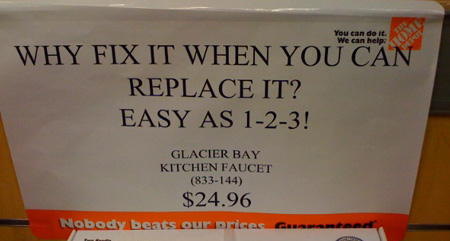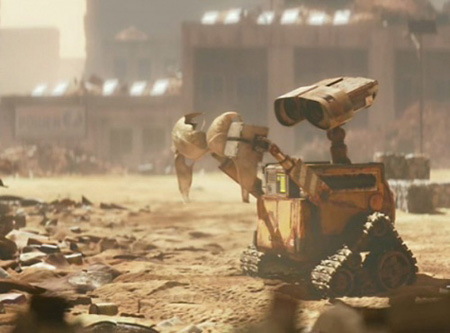Forget about science fiction; WALL-E is séance fiction -- it channels the soul of our land-loving founding father, Thomas Jefferson. Now that a handful of loose wingnuts is denouncing WALL-E as a piece of pro-planet propaganda, I'd like to note, for the record, that Jefferson would have absolutely loved WALL-E.
Normally, I wouldn't presume to speak for the primary author of the Declaration of Independence, but given Jefferson's reverence for our most precious resource, i.e., the soil, he surely would have appreciated the underlying message of Pixar's latest animated opus -- that it's our civic duty to be good stewards of the land.
Yeah, yeah, I know that WALL-E's creator, Andrew Stanton, is insisting that WALL-E is first and foremost a love story, but the whole plot hinges on another relationship: the one between us and the dirt beneath our feet. Jefferson was an early advocate of maintaining soil fertility through such practices as crop rotation, and would doubtless be horrified by the pollution and depletion of our topsoil that's become standard operating procedure since the advent of industrial agriculture.
(Of course, he'd also be appalled that the Fourth of July has turned into a giant meat-fest; Jefferson was an unabashed lover of fruits and veggies who maintained that produce should dominate our diet and meat should be used sparingly, as a "seasoning" or "condiment.")
Set in the year 2815, 700 years after the Earth's been trashed by mindless consumers and a monolithic corporation named Buy n Large, WALL-E depicts a nation whose excesses have launched it into perpetual astro-exile on a fleet of super-duper Buy n Large-sponsored spaceships. Its morbidly obese, infantalized citizens, too fat to stand upright, zip around aimlessly on their hovercraft-style loungers sipping sodas, playing video games, and awaiting the day the Earth will have detoxed enough to be "recolonized."
Some folks are eager to dismiss this cautionary tale of a corpulent corporatocracy as a far-fetched scenario aimed at advancing some eco-extremist agenda, but it's an eerie echo of the warnings from Jared Diamond, the Pulitzer-Prize winning UCLA professor of geography and author of Collapse: How Societies Choose to Fail or Succeed. In a precursor to Collapse that Diamond wrote for Harper's back in 2003, he challenged the conventional wisdom that we have to weigh environmental concerns against economic considerations, citing the popular misconception that:
...we must balance the environment against human needs. That reasoning is exactly upside-down. Human needs and a healthy environment are not opposing claims that must be balanced; instead, they are inexorably linked by chains of cause and effect. We need a healthy environment because we need clean water, clean air, wood, and food from the ocean, plus soil and sunlight to grow crops. We need functioning natural ecosystems, with their native species of earthworms, bees, plants, and microbes, to generate and aerate our soils, pollinate our crops, decompose our wastes, and produce our oxygen. We need to prevent toxic substances from accumulating in our water and air and soil... Our strongest arguments for a healthy environment are selfish: we want it for ourselves, not for threatened species like snail darters, spotted owls, and Furbish louseworts.
In WALL-E's world, mankind has failed to recognize this inexorable link, forcing a mass exodus into outer space and leaving behind a barren landscape littered with post-consumer crap and unable to support any vegetation.
Watching WALL-E trundle through this lifeless landscape on his daily rounds, compacting garbage and salvaging such manmade marvels as a spork and a Rubik's cube, you realize that it's not about saving the earth. The planet will, in all likelihood, be able to withstand whatever drastic alterations to its ecosystem we've unwittingly unleashed. It's ourselves we have to save.
Will we figure this out in time to avert the kind of catastrophic future portrayed in WALL-E? As Diamond notes in Collapse:
:Perhaps the crux of success or failure of a society is to know which core values to hold onto, and which ones to discard and replace with new values."
If only we had a clue about what to discard and what to replace. After leaving a matinee of WALL-E last weekend, I stopped into the Chelsea Home Depot, which, in a rare concession to place, is housed in an elegant turn-of-the-century cast-iron building. On my way to the garden department to buy mulch for my windowboxes, I passed a display of cheap kitchen faucets with a sign reading, "Why Fix It When You Can Replace It?"

No wonder we're the trashiest people on the planet. If the Great Pacific Garbage Patch grows any bigger, we'll have to colonize it and declare it the 51st state. The signs that our habitat's under siege are everywhere, but our "Drive All You Want, We'll Drill More" culture motors on, oblivious. With the cost of a barrel of oil setting new records each day, more and more Americans reportedly support the idea of offshore drilling, despite the fact that it can't possibly solve the underlying problem that demand is increasingly going to outstrip supply as China and India follow in our tire tracks.
Sadly, WALL-E's anti-consumer, anti-corporate message is undermined by the regrettable array of cheap, mass-produced WALL-E tchotchkes destined for the garbage heap. It's a shame that Pixar couldn't pass on the obligatory merchandise tie-ins, but that doesn't diminish the importance of the film's S.O.S: Save Our Soil. It's a message that this nation of babies, big and small, needs to heed. Colony collapse disorder--it's not just for bees!
Our 2024 Coverage Needs You
It's Another Trump-Biden Showdown — And We Need Your Help
The Future Of Democracy Is At Stake
Our 2024 Coverage Needs You
Your Loyalty Means The World To Us
As Americans head to the polls in 2024, the very future of our country is at stake. At HuffPost, we believe that a free press is critical to creating well-informed voters. That's why our journalism is free for everyone, even though other newsrooms retreat behind expensive paywalls.
Our journalists will continue to cover the twists and turns during this historic presidential election. With your help, we'll bring you hard-hitting investigations, well-researched analysis and timely takes you can't find elsewhere. Reporting in this current political climate is a responsibility we do not take lightly, and we thank you for your support.
Contribute as little as $2 to keep our news free for all.
Can't afford to donate? Support HuffPost by creating a free account and log in while you read.
The 2024 election is heating up, and women's rights, health care, voting rights, and the very future of democracy are all at stake. Donald Trump will face Joe Biden in the most consequential vote of our time. And HuffPost will be there, covering every twist and turn. America's future hangs in the balance. Would you consider contributing to support our journalism and keep it free for all during this critical season?
HuffPost believes news should be accessible to everyone, regardless of their ability to pay for it. We rely on readers like you to help fund our work. Any contribution you can make — even as little as $2 — goes directly toward supporting the impactful journalism that we will continue to produce this year. Thank you for being part of our story.
Can't afford to donate? Support HuffPost by creating a free account and log in while you read.
It's official: Donald Trump will face Joe Biden this fall in the presidential election. As we face the most consequential presidential election of our time, HuffPost is committed to bringing you up-to-date, accurate news about the 2024 race. While other outlets have retreated behind paywalls, you can trust our news will stay free.
But we can't do it without your help. Reader funding is one of the key ways we support our newsroom. Would you consider making a donation to help fund our news during this critical time? Your contributions are vital to supporting a free press.
Contribute as little as $2 to keep our journalism free and accessible to all.
Can't afford to donate? Support HuffPost by creating a free account and log in while you read.
As Americans head to the polls in 2024, the very future of our country is at stake. At HuffPost, we believe that a free press is critical to creating well-informed voters. That's why our journalism is free for everyone, even though other newsrooms retreat behind expensive paywalls.
Our journalists will continue to cover the twists and turns during this historic presidential election. With your help, we'll bring you hard-hitting investigations, well-researched analysis and timely takes you can't find elsewhere. Reporting in this current political climate is a responsibility we do not take lightly, and we thank you for your support.
Contribute as little as $2 to keep our news free for all.
Can't afford to donate? Support HuffPost by creating a free account and log in while you read.
Dear HuffPost Reader
Thank you for your past contribution to HuffPost. We are sincerely grateful for readers like you who help us ensure that we can keep our journalism free for everyone.
The stakes are high this year, and our 2024 coverage could use continued support. Would you consider becoming a regular HuffPost contributor?
Dear HuffPost Reader
Thank you for your past contribution to HuffPost. We are sincerely grateful for readers like you who help us ensure that we can keep our journalism free for everyone.
The stakes are high this year, and our 2024 coverage could use continued support. If circumstances have changed since you last contributed, we hope you'll consider contributing to HuffPost once more.
Already contributed? Log in to hide these messages.

